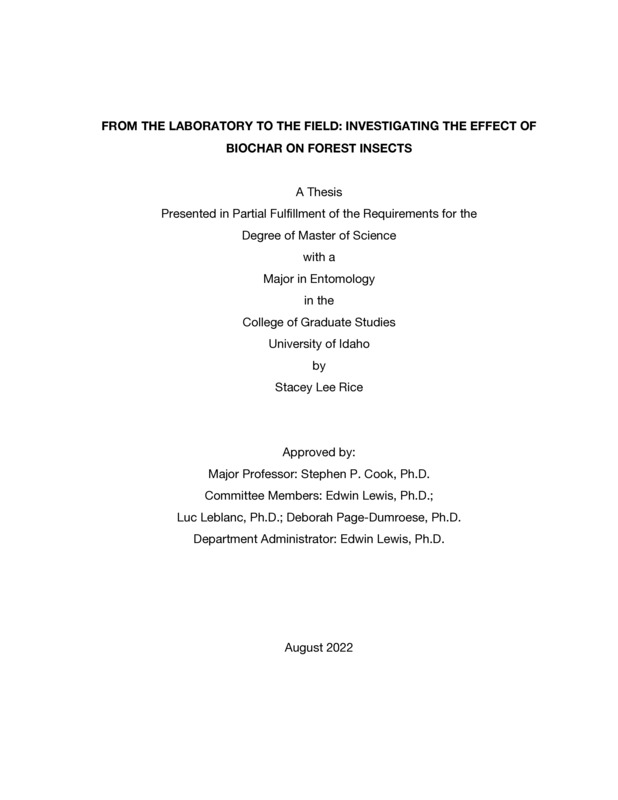From the Laboratory to the Field: Investigating the Effect of Biochar on Forest Insects
Rice, Stacey Lee. (2022-08). From the Laboratory to the Field: Investigating the Effect of Biochar on Forest Insects. Theses and Dissertations Collection, University of Idaho Library Digital Collections. https://www.lib.uidaho.edu/digital/etd/items/rice_idaho_0089n_12408.html
- Title:
- From the Laboratory to the Field: Investigating the Effect of Biochar on Forest Insects
- Author:
- Rice, Stacey Lee
- ORCID:
- 0000-0002-8910-5495
- Date:
- 2022-08
- Keywords:
- Biochar Cerambycidae Forest defoliator Forest management Scolytinae Soil amendment
- Program:
- Entomology, Plant Path & Nematology
- Subject Category:
- Entomology
- Abstract:
-
ABSTRACT
Insects provide numerous ecosystem services in a forest environment, such as pollination, nutrient cycling, as well as providing disturbance. Defoliating lepidoptera such as Douglas-fir tussock moth (Orgyia pseudotsugata Lepidoptera: Erebidae) attack healthy trees, predominantly true firs (Abies sp.), Douglas-fir (Pseudotsuga menziesii (Mirb.) Franco), and spruce (Picea sp.), and convert tree foliar biomass into frass, contributing soil organic matter within the forest ecosystem that benefit soil organisms. In outbreak years, high densities of O. pseudotsugata may consume all available foliage. Defoliation of large forest stands allows for light to penetrate to the undergrowth and accelerate the regenerative succession of the forest stand. Wood boring insects including bark beetles help to cycle nutrients by increasing the rate of breakdown of woody material which also contributes to accumulation of soil organic matter.
Biochar is a carbon-rich material made via thermochemical decomposition of organic matter in a high temperature, low oxygen environment. Biochar can be created from many types of organic material such as discarded slash material during logging of overstocked stands or beetle killed trees, and used as a soil amendment to restore degraded soils. Biochar has been used to sequester carbon, and to increase soil water holding capacity and plant available water. Forest insects may be exposed to biochar when the material is applied to surface organic horizons and downed trees. The results of recent laboratory studies show a potential negative effect on insects exposed to biochar material, although field experiments are necessary to establish how insects are affected by the application of biochar in a forest system.
In the first experiment, direct exposure of O. pseudotsugata to biochar either on the surface of or incorporated within synthetic diet negatively affected survival and weight gain of the insects. Although the physiological effects of biochar are unknown, the low 10% volume/volume biochar treatment potentially may lead to compensatory feeding by the insects. Two field experiments were performed using sections (bolts) of ponderosa pine (Pinus ponderosa Lawson & C. Lawson), to determine if biochar applied to the bark surface (1) interfered with attack or emergence of the pine engraver beetle Ips pini (Say) (Coleoptera: Curculionidae: Scolytinae) when bolts were baited with a pheromone lure, or (2) altered species richness or abundance of insect assemblages on non-baited bolts. Similar mean density of nuptial chambers and emergence indicated both control and biochar treated bolts were suitable habitat for I. pini. Species richness was greater in the non-treated control bolts compared to the bolts treated with biochar for emerged insects in the test that compared bolts that did not receive a pheromone treatment. Red turpentine beetles, Dendroctonous valens (LeConte) (Coleoptera: Curculionidae: Scolytinae) were more abundant in non-treated control bolts as compared with the biochar treated bolts. Colonization by other insect taxa were not found to be significantly different between non-treated control bolts and bolts treated with biochar, although the insects that emerged from each bolt varied.
- Description:
- masters, M.S., Entomology, Plant Path & Nematology -- University of Idaho - College of Graduate Studies, 2022-08
- Major Professor:
- Cook, Stephen P
- Committee:
- Page-Dumroese, Deborah; Lewis, Edwin; Leblanc, Luc
- Defense Date:
- 2022-08
- Identifier:
- Rice_idaho_0089N_12408
- Type:
- Text
- Format Original:
- Format:
- application/pdf
- Rights:
- In Copyright - Educational Use Permitted. For more information, please contact University of Idaho Library Special Collections and Archives Department at libspec@uidaho.edu.
- Standardized Rights:
- http://rightsstatements.org/vocab/InC-EDU/1.0/

